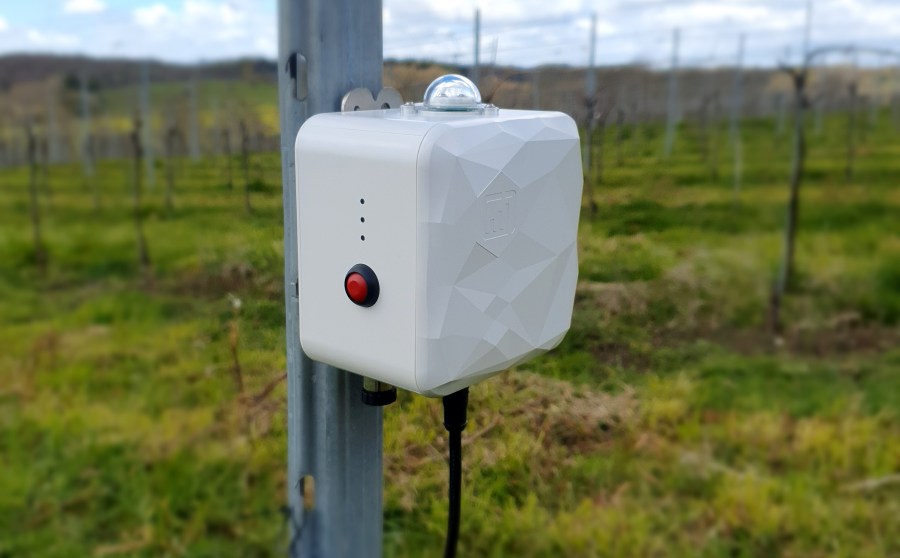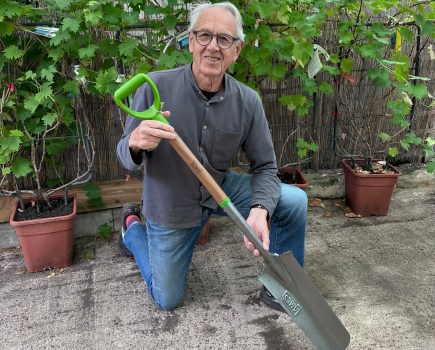An innovative frost forecasting and management project for grape vines, with the potential to revolutionise frost-related crop protection, has secured over £300,000 in funding from Innovate UK and the Department for the Environment Food and Rural Affairs (DEFRA).
Called Smarter Forecasting, Communication and Management of Frost Risk in Vineyards, the project will aid the development of domestic viticulture, the UK’s fastest expanding agricultural sector. It will create hyper-localised, site-specific, and variety-specific frost risk forecasts, enabling vineyard managers to make more informed, targeted, and sustainable choices when responding to frost events.
The project is being led by sensor manufacturer Terraprima and agri-tech facilitator Agri-Epi Centre, and supported by land-based education provider Plumpton College, vineyard and winery consultancy Vinescapes, vineyard monitoring solution Vinewatch, weather forecasting provider WeatherQuest, and Wines of Great Britain (WineGB), the trade body for the English and Welsh wine industry.
Sensors installed in Dillions Vineyard (West Sussex), JoJo’s Vineyard (Oxfordshire), Tanhurst Estate Vineyard (Surrey), Plumpton College (East Sussex), Ridgeview (East Sussex), and Quarry Wood (East Sussex) will be used to assess frost risk at a micro level. By combining weather forecasting models with mapped frost risk assessments and real-time on-site measurements from the sensors, the project will launch site-specific forecasts of both frost risk and frost type.
This site-optimised forecasting will subsequently be available through an app, which will deliver frost alerts to mobile devices.
The number and severity of UK spring frost events causing vine damage varies from year to year and in bad years can contribute to significant yield loss. With climate change leading to warmer springs and an earlier budburst (the time when vines are at risk of damage), UK vineyards are expected to remain vulnerable to impactful frost events. This project will enable vine growers to have a more focused approach to protecting their crop by only concentrating on both the specific areas that have been identified as being at risk and the intervention techniques which are best suited to the forecast conditions.
The UK currently has just under 4,000 hectares under vine and this is projected to hit 7,600 hectares by 2032, according to figures published by WineGB.
The project will last for two years, and the grant was secured through Innovate UK’s ‘Farming Futures: Environmental Resilience, Feasibility’ funding competition, a collaboration between the Department for Environment, Food and Rural Affairs (Defra) and the UKRI Transforming Food Production Challenge.
Commenting on the project, Ben Gillingham, Managing Director of Terraprima, said: “This important and exciting project brings together some of the leading players in UK viticulture to improve the sector’s resilience against one of the greatest yield threats we face. The Terraprima Ladybird is ideal for accurately capturing the highly localised climate data required for accurate frost forecasting and we look forward to helping protect UK vines both during and after the project.”
Eliot Dixon, Head of Agri-Tech Engineering at Agri-Epi Centre, added: “Through this project, we will be providing a vital early warning of frost risk to vineyard managers, at a precision never achieved previously. This uses a fusion of weather modelling, IoT sensors and remote sensing to create a robust and commercially relevant solution that shows the very best of UK agri-tech.”
Sam Linter, Director of Wine at Plumpton College, said: “Spring frost is a significant threat for many grape growers in the UK, requiring understanding on forecasting and management options. Being involved in such an innovative frost management project, bringing together different approaches and modelling systems, gives our students exposure to the current and developing technologies. Plumpton College is proud to be associated with this research in progress that supports the productivity of the industry and the students’ future careers.”
Dr Alistair Nesbitt, CEO of Vinescapes, commented: “This funding is excellent news for the sector. Through this project we will bring together a fantastic skill set to try and develop tools that growers in the UK will benefit from in both forecasting and managing frosts. We know early season frost risk is a significant concern for many producers and it’s being enhanced with climate change and an increase in climate variability, but the good news is that with the right tools and equipment, we know the risk can be reduced and managed – and that’s what we aim to support through this project.”
Sebastian Holmes, Operations Director at Vinewatch, said: “Using established technology in an innovative way to help growers to monitor and mitigate the perils of frost is exciting. We have been developing this approach for some time and we’re delighted to see it finally becoming reality. Our aim is to provide growers with the best precision tools they can get to let them counter an extremely damaging and mostly unpredictable threat to their productivity, sales and profits.”
Marcus Krumins, Data Scientist at WeatherQuest, said: “Our project is developing a service which forewarns the location, intensity and type of any anticipated vineyard frost event, calibrated to actual vineyard temperature measurements. We’ll support a step-change in UK vineyard frost resilience and help vineyard teams optimise which frost mitigation technique to choose.”
Phoebe French, Membership Engagement Manager at Wines of Great Britain, said: “Frost events can significantly affect grape yields and require vineyard managers to be on alert throughout the night, often for days on end. This project will give vine-growers greater control of their frost management and hopefully their sleep schedule!”




